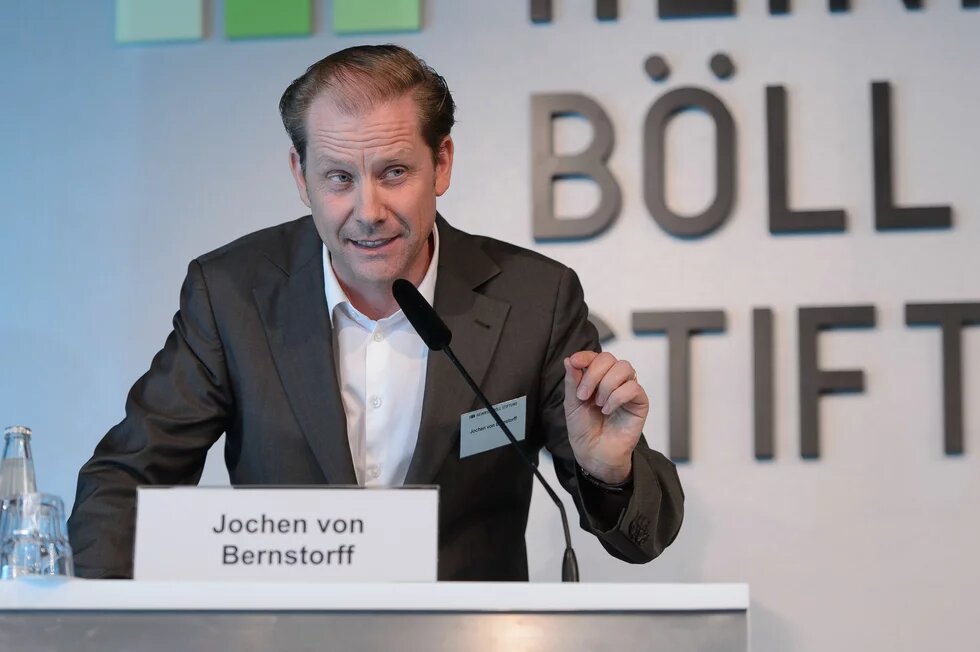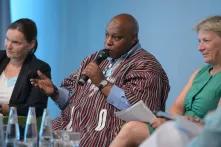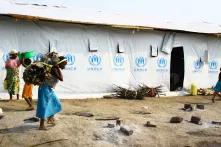
Menschenrechte leiden unter der Globalisierung. Es braucht faire wirtschaftliche Regeln und neue Formen der öffentlichen Umverteilung des Wohlstands. Der Völkerrechtler Jochen von Bernstorff erklärt den Nexus von ökologischer Nachhaltigkeit, Gerechtigkeit und Menschenrechten. Eine Präsentation in englischer Sprache.
Today global justice as a topic of moral philosophy and international law is back on the intellectual agenda and figures prominently in feuilletons, blogs and academic publications. A wave of recent studies by both international lawyers and moral philosophers on the dark side of economic globalization and the role of international law and human rights in this context is as such a remarkable phenomenon. This global justice debate takes place while within the United Nations we are today in the midst of the run up to the adoption of so called post 2015 Sustainable Development Goals (the SDGs).
I have been asked to introduce some thoughts from this current debate and to comment on them, before this conference will deal with particular policy debates in the post 2015 SDG-process. Please do not expect concrete policy solutions from me but an (international lawyer’s) academic’s bird’s eye view on the theme of global social and environmental justice and its relationship to international law and human rights. Three substantive questions will structure my presentation:
- Is the current international economic and social order unjust?
- Who bears the responsibility for current injustices; can existing international legal rules and institutions be transformed or developed into a more just economic and social order?
- What is the potential role of international law and human rights in this context?
1. Is the Current International Economic and Social Order Unjust?
Judging by its outcomes the answer is "yes". At least this seems to be the answer given by practically all the current contributions to the academic debate – Amartya Sen, Thomas Pogge, Allen Buchanan, David Miller, Thomas Nagel, Iris Marion Young and Jürgen Habermas – just to name a few prominent moral philosophers. All seem to agree that the distribution of wealth and the conditions of "extreme poverty" for hundreds of millions of people is unjust. Of course, and depending on the author, this "yes" is often not a black and white one, but comes in many different shades of grey. Nonetheless, authors who respond to this question with a straight "no" are very hard to find.
Let me start with a black and white response. Most prominently here we find Thomas Pogge, who from the perspective of a moral philosopher has emerged as one of the most vocal and critical voices regarding the current global economic order, constantly reminding us of the scale of persisting inequalities produced by extreme poverty in many regions of the world:
"Many more people – some 360 million – have died from hunger and remediable diseases in peacetime in the 20 years since the end of the Cold War than perished from wars, civil wars, and government repression over the entire twentieth century".
For Pogge, it is the current design of international institutions that makes these staggering inequalities between the affluent and the poor possible.
"The present rules favor the affluent countries by allowing them to continue protecting their markets through tariffs, anti-dumping duties, quotas, export credits, and huge subsidies to domestic producers in ways that poor countries are not permitted, or cannot afford, to match".
The prominent French international lawyer Emmanuelle Tourme-Jouannet, in What Is a Fair International Society?, assesses the state of the world in 2014 in similar terms. For her the rules governing globalization are unfair as they are designed once again primarily with the advanced industrial nations in mind: "Certainly, some emerging countries have benefited from them, but the rules are not equitable […] Contrary to the idea that globalisation benefits everyone, there are losers on both sides, North and South". Indeed, in some countries such as China the number of people living in poverty has dropped considerably. However, also according to World Bank reports, the same globalized economic system, which has enabled growth in parts of Asia is thought to have exacerbated poverty in other parts of the World. Everywhere inequality between rich and poor is rising: in the OECD-countries as well as in Brazil, Russia, India, China and South Africa. A couple of straightforward solutions to this problem provided by taxation, developed by famous economists – Piketty being just one of them – are on the table, but there is no political momentum among governing elites in most countries to implement them. In sum, most global justice-authors seem to agree that, as Tourme-Jouannet puts it, "poverty, hunger and economic and social inequalities between states persist in terrifying and unacceptable proportions".
This academic view of the current state of affairs corresponds to Ban Ki Moon’s assessment in his most recent report on the post 2015 SDG-process:
"Yet conditions in today’s world are a far cry from the vision of the (UN-) Charter. Amid great plenty for some, we witness pervasive poverty, gross inequalities, joblessness, disease and deprivation for billions. Displacement is at its highest level since the Second World War. Armed conflict, crime, terrorism, persecution, corruption, impunity and the erosion of the rule of law are daily realities. The impacts of the global economic, food and energy crises are still being felt. The consequences of climate change have only just begun. These failings and shortcomings have done as much to define the modern era as has our progress in science, technology and the mobilization of global social movements."
2. But who bears the responsibility for the dire status quo?
To start with it seems undisputed that governments of poor countries themselves bear a responsibility to do everything in their power to combat poverty and social as well as economic inequality. This requires robust democratic institutions, effective domestic legal systems, respect for human rights and concrete pro-poor policies and related interventions in markets. But the debate on global justice shows a clear trend towards understanding responsibilities in a much broader sense, namely by focusing also on the responsibility of those countries, which so far have profited economically from the existing rules – which are the OECD-countries plus the BRICS-countries.
In a way the sociological insights of the dependence theories of the 1960s, which insisted that our wealth and way of living is connected with the persistence of poverty abroad – are experiencing a strong revival and are now being promoted by moral philosophers. This trend in moral philosophy at the same time follows civil society movements, which had understood much earlier that responsibility for poverty cannot only be located in the Global South alone.
For Thomas Pogge, the unfair global rules of the game, made by or at least in conjunction with OECD-countries, lead to a massive violation of human rights, which creates a moral obligation on the part of the rich countries to alleviate world poverty. Pogge and Allen Buchanan argue in favour of a cosmopolitan requirement of global distributive justice. Based on a concept of "equal positive freedom", Carol C. Gould sides with the cosmopolitan requirement of global distributive justice. She proposes concrete practical directions for the realization of her claims, which focus on an enhanced system of implementing economic, social and cultural rights and the democratization of global governance mechanisms. These cosmopolitan approaches, which aim at erasing well established philosophical distinctions between moral obligations of justice within a given political community on the one hand and transnational obligations of justice on the other, can be distinguished from the classic approaches taken by John Rawls, David Miller and Thomas Nagel on this particular issue. While Pogge, Buchanan and Gould insist that global redistribution is required by principles of justice, Rawls, Miller and Nagel restrict principles of justice in the narrow sense to the state level. None of the latter three philosophers, however, believes that there are no moral obligations, which extend beyond borders. For Thomas Nagel, for instance, an obligation to redistribute wealth globally does not stem from principles of justice but from "elementary considerations of humanity".
These authors are not alone in their philosophical call for a redistribution of wealth on the global level based on the assumption of extraterritorial moral obligations to alleviate poverty also abroad. As to the idea that we are connected to injustices taking place somewhere else not only because of empathy but through our actions and daily routines, the prominent US-American philosopher Marion Young had advanced a new and sophisticated model of responsibility for structural global injustices. From her so called social connection model of responsibility it follows that all those who contribute through their actions to the processes that produce structural injustice share responsibility for those harms: Even though according to her "social connection model of responsibility" we might not be directly “liable” for the harm produced by structural injustices, such as exploitation of workers in the global garment market or Western export subsidies on agricultural products, we bear an individual forward-looking responsibility for our contributions to social systems that produce these structural injustices.
This idea of complicity in structures that produce injustices in distant places is of course also highlighted in the debates over global environmental justice and climate change. Moreover, the postcolonial "turn" in the humanities and social sciences reminds us of the fact that European responsibilities for the Global South have a historical dimension that cannot be easily dismissed – this historical dimension currently resurfaces in many international fora – such as in the negotiations about the climate change regime. European colonialism is now being told by historians as a story of economic exploitation of the subjected peoples of the Global South, which according to many voices has evolved into new forms of economic and political dominance of the West – so there is a strong revival of the Third World Critique of the 1960s and 70s.
Additionally – to make things even more demanding – most justice theories also agree in principle that we are not only potentially responsible for current injustices in the Global South but also for future injustices: The Brundtland Report famously defined sustainability as meeting "the needs of the present without compromising the ability of future generations to meet their own needs". Amartya Sen has reformulated sustainability in line with his capabilities-approach as the preservation and (when possible) expansion, of the substantive freedoms and capabilities of people today "without compromising the capability of future generations to have similar – or more – freedom".
Let me summarize this short overview of the responsibility-debate: There is a clear trend towards the recognition of responsibilities of actors outside the countries of the Global South: The philosophical debate here seems to follow global civil society organisations in their campaigns for a recognition of our responsibilities and so called “extraterritorial human rights obligations” and we also have responsibilities for the well-being and enjoyment of rights of future generations. A central question emerging from the global justice debate on institutional and individual responsibilities is the extent to which international law and its institutions are considered a key mechanism to either cement or alleviate staggering inequalities between the affluent and the poor countries.
3. What is the role of international law in the debates over global justice, sustainability and human rights?
First of all, international law over the last twenty years has erected international institutions, which protect the interests of strong economic actors, be them public or private. Let me mention the two most prominent fields here – international trade law and international investment law.
The WTO from Seattle onwards has been under critical scrutiny of civil society movements – the answer to the question of the responsibility of this institution with regard to poverty and inequality is probably not a black and white one. If one looks again into the recent global justice – and related international law literature, there seems to be a consensus that at least a range of measures and operations within this institutional system carried out by OECD-countries over the last twenty years have aggravated poverty in the Global South or in less critical terms such measures have prevented that the potentially positive effects the institution could otherwise have had on countries in the Global South could be realized.
According to Jeffrey Dunoff, it "may well be true that changes to existing trade rules could do much to address global poverty, much more should and can for example be done to improve free access for products from developing states, lower developed-state tariff peaks and tariff escalation in products of particular importance to developing states, and most importantly much more could be done to reduce developed state producer support. Trade-distorting agricultural support in OECD states remains unacceptably high, negatively impacting the prospects for developing-country agriculture."
That the TRIPS agreement, which institutionalised global patent protection rules under the WTO in 1994, was a bad deal for the developing world is by now also fairly undisputed in the literature – even among international economic lawyers. Another important insight from the current debate is that the damage produced by all these measures cannot be compensated by the preference schemes for developing countries, which have absorbed most of the attention and efforts in favour of the Third World within the WTO. Thus, what we have is a concrete list of what could be done on the side of OECD countries within the WTO system to combat poverty in the Global South, a list that is well known and is by the way echoed by almost all commentators in the global justice debate.
The second area is international investment law: Alongside the Washington Consensus with its structural adjustment policies and the rise of transnational investment flows, a powerful regime of by now almost 2000 bilateral investment treaties has emerged, which protects foreign investors against regulatory measures of host states through compulsory investor-state arbitration. I can't go into detail here, but many of the SDGs that are currently being discussed can only be implemented by intensive public-law regulation of strong private economic actors, including foreign investors, with the aim to protect the environment and citizens.
However, there is a problem: The way in which the international investment regime has developed over the last twenty years has made such measures increasingly difficult for national governments to implement. This has to do mainly with the institutionalised bias in this regime against public regulation of foreign investors. Even though arbitrators legally could already in the present system hand down decisions, which apply human rights and environmental standards to the particular case, it is sociologically highly unlikely that they will do this in a manner that will remedy the internal anti-regulatory bias of the regime. Only a substantial reform of the investment regime and clear rules, which establish a prevailing right of host states to regulate foreign investors for social and ecological purposes would change this situation.
Let me now turn to human rights: The first observation from an international law perspective is that despite all the achievements of the last 25 years, the degree of institutionalisation of international human rights law still is a far cry from what it should be. Today we have global rule of law for foreign investors but we do not have it for victims of human rights abuses. In the intellectual climate of the last 25 years it has been much easier for strong economic actors to institutionalise their preferences in international law than those of billions of people living in poverty. Nonetheless, the human rights movement has achieved a lot over the last 25 years – human rights – through the renaissance of economic, social and cultural rights – undeniably have become the dominant language, in which the dark sides of economic globalisation can be articulated and criticized.
In the context of sustainable development I think the most important contribution of the global human rights movement precisely was and is its campaign to remedy a one-sided approach to growth-based development. The fact that the wealth created by globalization – in many countries did not “trickle down” to the people in need or that new economic resources were allocated through discriminatory practices, or that growth related developmental measures led to the destruction of the livelihoods of millions of people in the Global South. All of these facts can now be called human rights violations. And through the notion of extraterritorial human rights obligations it is not only the host state but also the home states of investors who bear a responsibility for abuses abroad.
But how strong is the rights discourse in practice when it comes to prevent, regulate or remedy social transformations induced by the forces of economic globalisation and environmental degradation? And how do the currently debated Sustainable Development Goals handle this relationship? The idea behind the SDG-process is the integration of prima facie equally valued meta-goals of economic growth, rights protection and environmental sustainability – even though so far human rights do not yet have the same prominence and visibility in the text. The integration of economic growth, human rights, and protection of the environment is of course – at this level of abstraction – a highly desirable state of the world.
But it seems also clear that on more concrete policy levels – there can and will be conflicts between these three goals. Take as the most obvious ones conflicts between environmental sustainability and economic growth. According to a recent study published in the journal Nature, if we are to prevent a temperature increase beyond two degrees Celsius until 2050, over 80 percent of today’s globally remaining coal resources need to remain unused. Such a measure would definitely have a cooling effect on coal-based economic growth in many regions of the world. It has become increasingly clear that the current development model of GDP-related growth must be re-conceptualized; simply because it is physically impossible for the whole world to enjoy the material lifestyle enjoyed by the developed states without producing an environmental apocalypse.
Or take human rights and environmental sustainability – In order to save mankind from the catastrophic consequences of climate change, for instance in the Global South the number of protected natural reserves will have to increase dramatically (a goal pursued inter alia by the REDD mechanism). This will have an impact on the rights of poorer communities, including indigenous communities, living from this land. Or take the above mentioned conflict between GDP-growth through foreign investment on the one hand and the rights of workers and local people that have been displaced because of an investment project on the other. As a general point I think it should be mentioned in this context, that the clear trend in international human rights law towards rights to participation and veto-rights of local communities in development-induced transformations of their livelihoods does not figure prominently in the SDGs – to put it mildly. You could add many more examples where despite beautiful semantic integration in the SDGs these goals will continue to collide in practice.
What does this mean for human rights protection? First I think what we can learn from the pseudo-harmonic relationship between individual freedom and neoliberal growth over the last 25 years is that whenever there are conflicts in practice those preferences will prevail which can rely on the strongest institutions which means that as long as we do not reform both domestic institutional settings and the rules of the global economic order, both human rights and environmental sustainability will eventually lose out.
And second – there is in my view no way around global redistributive measures beyond classic development aid – if we for instance don’t want the Global South to go down the road of coal based industrialization, we will have to compensate these countries for potential economic losses – in particular since the industrialized West historically so far undeniably had the greatest share in destroying the atmosphere – with China and India now catching up. The same is true for the redistribution of profits generated by the exploitation of resources and other foreign investments in developing countries. If we continue to promote such investments, which do not create welfare-gains for those in need in developing countries and shield investors from public interest regulation – a one sided economic globalisation will continue. Another necessary form of redistribution is to allow poverty-related migration into OECD-countries – and to create acceptable conditions and inclusive societal structures for those fleeing from the consequences of climate change and loss of economic opportunities.
By way of conclusion the decisive question from the perspective of human rights law in my view is – whether human rights are sufficiently institutionalised to prevail in the interests of victims? Institutionalisation requires further reform efforts on the domestic and international level in the area of political and judicial implementation. Rule of law reform, international human rights and binding obligations of transnational corporations courts are catchwords in this context. I think it is very important to continue in these efforts – but they should not be perceived as an isolated struggle within national and international human rights law – reform efforts must also include the struggle to modify existing regimes in international economic law – otherwise isolated reforms within the human rights machinery might turn out to be not more than a drop in the ocean of a one-sided economic globalisation. Or to put it differently: Human rights will continue to bear the brunt of addressing both the dark sides of economic globalisation and the human suffering created by climate change. However, in a world with fair economic rules and new forms of public redistribution of wealth, human rights could not only address human suffering but also become a globally effective mechanism to prevent and remedy such violations.
Dieser Beitrag wurde als Keynote am 12.06.15 auf der Konferenz "Verantwortung einfordern!" der Heinrich-Böll-Stiftung in Berlin gehalten. Die Keynote ist als pdf-Datei mit Literaturhinweisen hier verfügbar. Weitere Informationen und Beiträge zum Thema finden Sie in unserem Konferenzdossier.


